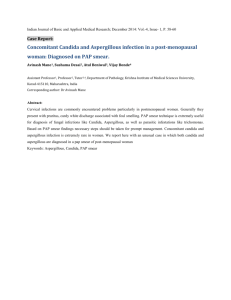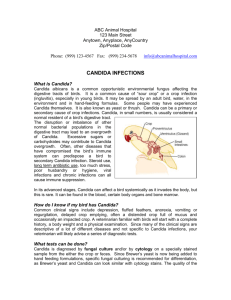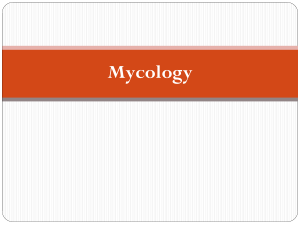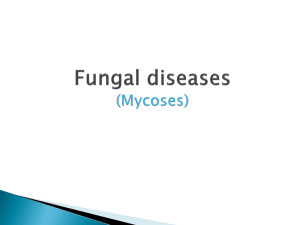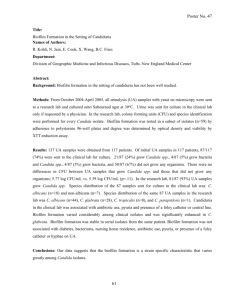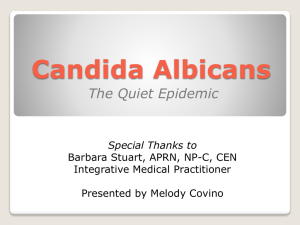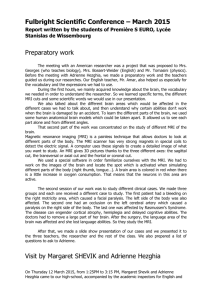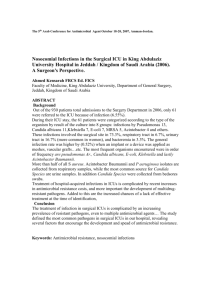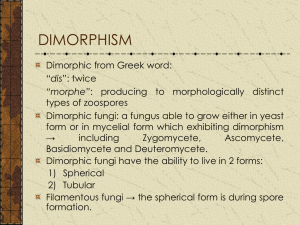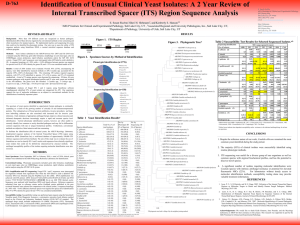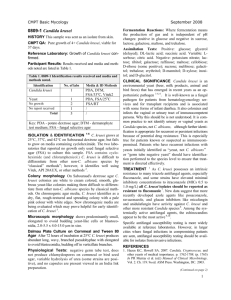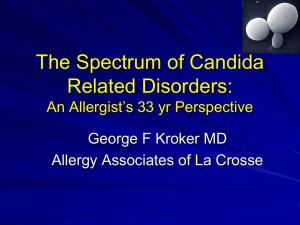All About Candida - Hands 2 Health Wellness Center
advertisement
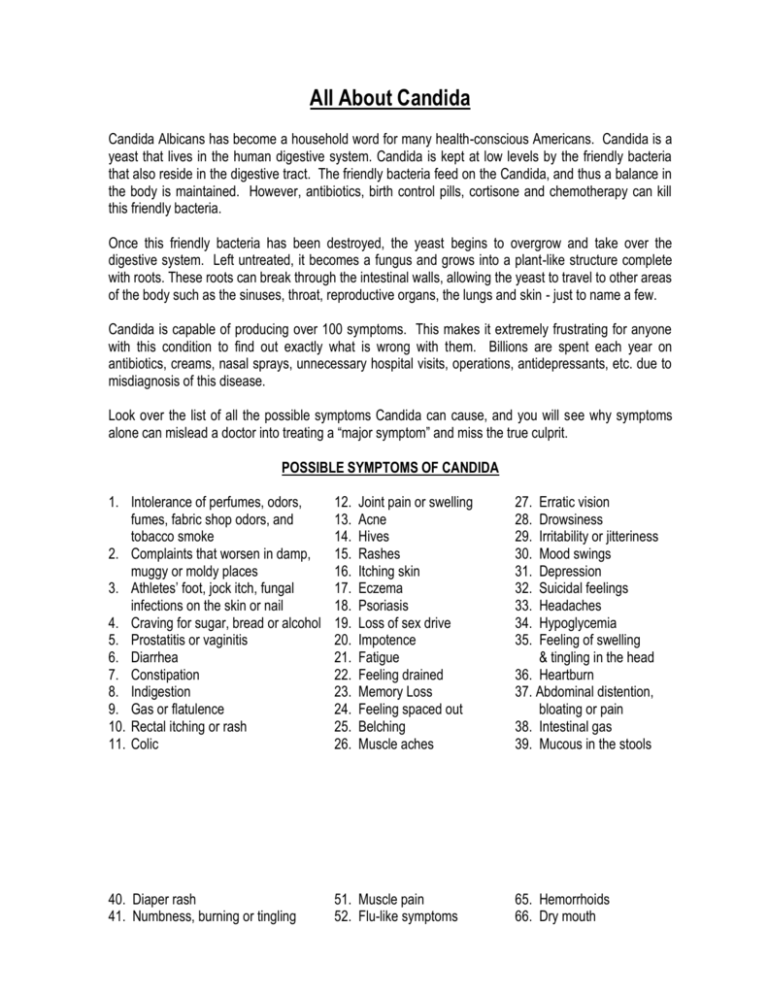
All About Candida Candida Albicans has become a household word for many health-conscious Americans. Candida is a yeast that lives in the human digestive system. Candida is kept at low levels by the friendly bacteria that also reside in the digestive tract. The friendly bacteria feed on the Candida, and thus a balance in the body is maintained. However, antibiotics, birth control pills, cortisone and chemotherapy can kill this friendly bacteria. Once this friendly bacteria has been destroyed, the yeast begins to overgrow and take over the digestive system. Left untreated, it becomes a fungus and grows into a plant-like structure complete with roots. These roots can break through the intestinal walls, allowing the yeast to travel to other areas of the body such as the sinuses, throat, reproductive organs, the lungs and skin - just to name a few. Candida is capable of producing over 100 symptoms. This makes it extremely frustrating for anyone with this condition to find out exactly what is wrong with them. Billions are spent each year on antibiotics, creams, nasal sprays, unnecessary hospital visits, operations, antidepressants, etc. due to misdiagnosis of this disease. Look over the list of all the possible symptoms Candida can cause, and you will see why symptoms alone can mislead a doctor into treating a “major symptom” and miss the true culprit. POSSIBLE SYMPTOMS OF CANDIDA 1. Intolerance of perfumes, odors, fumes, fabric shop odors, and tobacco smoke 2. Complaints that worsen in damp, muggy or moldy places 3. Athletes’ foot, jock itch, fungal infections on the skin or nail 4. Craving for sugar, bread or alcohol 5. Prostatitis or vaginitis 6. Diarrhea 7. Constipation 8. Indigestion 9. Gas or flatulence 10. Rectal itching or rash 11. Colic 12. 13. 14. 15. 16. 17. 18. 19. 20. 21. 22. 23. 24. 25. 26. Joint pain or swelling Acne Hives Rashes Itching skin Eczema Psoriasis Loss of sex drive Impotence Fatigue Feeling drained Memory Loss Feeling spaced out Belching Muscle aches 40. Diaper rash 41. Numbness, burning or tingling 51. Muscle pain 52. Flu-like symptoms 27. 28. 29. 30. 31. 32. 33. 34. 35. Erratic vision Drowsiness Irritability or jitteriness Mood swings Depression Suicidal feelings Headaches Hypoglycemia Feeling of swelling & tingling in the head 36. Heartburn 37. Abdominal distention, bloating or pain 38. Intestinal gas 39. Mucous in the stools 65. Hemorrhoids 66. Dry mouth 42. Endometriosis (irregular or painful menstruation) 43. Kidney, bladder infections 44. Cystitis (inflammation of the bladder with possible infection) 45. Sores or blisters in the mouth 46. Wheezing or shortness of breath 47. Food allergies or food reactions 48. Cramps or menstrual irregularities 49. Pain or tightness in the chest 50. Vaginal itch, burning, or persistent infections 53. 54. 55. 56. 57. 58. 59. 60. 61. 62. 63. 64. Sinus infections Bad breath Cough Hair loss P.M.S. Spots in front of eyes Asthmatic symptoms Burning on urination Burning or itching eyes Ear pain Ear discharges Ear aches 67. Nasal congestion 68. Post nasal drip 69. Sore or dry mouth 70. Nasal itching 71. Nasal discharge 72. Sore or dry throat 73. Thrush 74. General allergies 75. Hay fever 76. Painful intercourse As you can see, the symptoms are numerous and varied. Many times people give up on ever finding out what was wrong with them because these symptoms seem so unrelated. Symptoms can vary according to one’s diet. Sugar, alcohol, starches, fermented foods, sweets (even fruits) will increase symptoms by feeding the yeast organisms. This will cause them to grow and release more toxins which will produce more symptoms. CANDIDA TREATMENT CBT is a totally unique and powerful treatment for Candida. This revolutionary treatment stimulates your own immune system to eliminate the Candida overgrowth. No more than 4 successive CBT treatments are usually necessary, as long as you strictly adhere to the anti-Candida diet and take the prescribed probiotic supplements. Following your last treatment, the diet must be strictly followed for one additional week in order to prevent the Candida from returning. No matter what you may read on the internet, no Candida treatment is effective unless you also strictly adhere to an anti-Candida diet. Do not start the Candida treatments unless you are totally committed to following this treatment program. If you have even a small amount of food or beverage that is prohibited, more treatments (and expense) will be necessary to eliminate your Candida. You must carefully read the ingredients of anything you put in your mouth. Never assume that a certain food or beverage is safe to consume until you have thoroughly checked the ingredients. After each Candida treatment, you may experience mild to moderate fatigue or headaches. This results from toxins being released into your blood stream from the Candida that has been destroyed. Be sure to drink at least 8 glasses of water a day while being treated. This will help to flush the toxins from your colon. You should be having at least two bowel movements a day while being treated. It is OK to take natural bowel stimulants or laxatives in order to accomplish this. Colonics can also be very helpful during this time. Candida can be passed from one spouse to the other. It is therefore a very good idea to have your significant other checked for Candida. A mother who has Candida can also infect her children when she is pregnant or through breast-feeding. If you would like any family member to be checked for Candida, we will be happy to do so at no charge.
